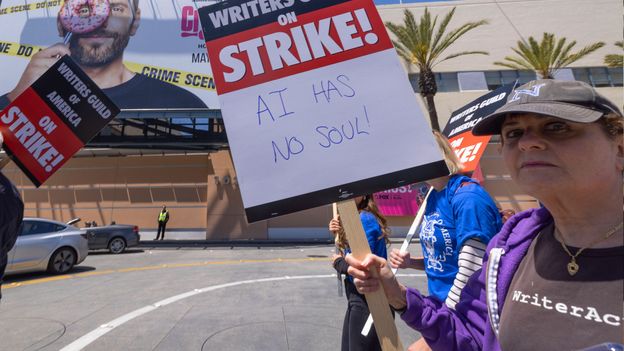This feeling of unease and existential panic can be extremely unnerving – and entirely justified in the current work landscape. But there’s reason to take a breath: as this technology finds its way into the mainstream and continues to evolve, experts say these worries don’t have to take over. Shoss says one of the best ways to handle identity-driven anxiety is to demystify the unknown. In ongoing research, she says, ‘we’ve found that people who tend to read more and try to learn more and develop more skills around the technology are a little bit less anxious about the impact of robots and AI in the workplace’. The threat can seem less imminent, she explains, once people understand the technology’s shortfalls and the need for human oversight. Jessica has taken this approach herself: ever since that first conversation with her boss, she’s thrown herself headlong into learning everything necessary to become her company’s resident AI expert. ‘I’ve immersed myself,’ she says. ‘I’ve done a complete 180, from ignoring it out of fear to fully diving in. I need to control the AI narrative at my company, and make sure that I’m in the driver’s seat and I’m telling them what ChatGPT and these other tools can and cannot do.’ Jessica feels her job is secure for now. But the technology’s evolution, she says, still feels like a relentless onslaught. Eventually, she believes AI will be able to take over many of the writing and editing tasks that make up much of her current workload. She’s trying to be proactive, working to refine skills that are tougher for AI to mimic and move into a more strategic role – and to find a new way to re-frame her identity. To ease identity anxiety, workers also may find it’s helpful to look at what, exactly, AI can do – and what human-led job tasks are still irreplaceable . It may actually be good if AI replaces menial tasks, says Jo Lindsay Walton, a research fellow in arts, climate and technology at the Sussex Digital Humanities Lab at the University of Sussex, UK. He points to tasks like transcription, which will become entirely automated. As this happens, he explains, workers will be able to focus not only on more essential, less robot-replicable, expertise, but also on more meaningful and satisfying work that can make them feel good about themselves. Plus, adds Walton, it’s worthwhile to remember that today’s workers aren’t the first to experience an existential crisis over automation. Since the Industrial Revolution, people have been threatened by machines promising to usurp their jobs and the things that mean a lot to them personally. ‘We can learn a lot about our present and future from how people in the past thought about their future,’ says Walton. But historically, those threats have been overblown, and humans have always retained an irreplaceable role in the workforce. ‘The high-level message is that they got it wrong,’ he adds, ‘and we are probably getting it wrong.’


